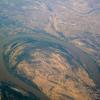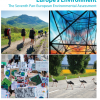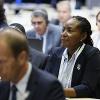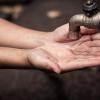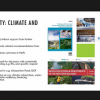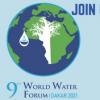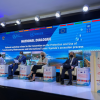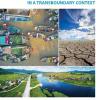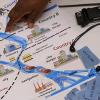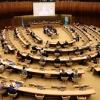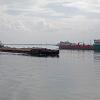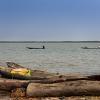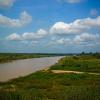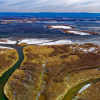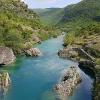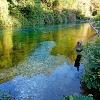Water Convention Press Releases
Displaying Results 26 - 50 of 133
The Dominican Republic has taken important steps to ensure the sustainability of its natural resources through better conservation, management and sustainable use of its transboundary waters. The Dominican Government undertook a process to accede to the United Nations Water Convention.
The
Le Cameroun est devenu la 47ème partie à la Convention des Nations Unies sur la protection et l'utilisation des cours d'eau transfrontaliers et des lacs internationaux (Convention sur l'eau) après l’approbation de l’adhésion au plus haut niveau par le Chef de l’Etat du Cameroun le 7 juillet 2022,
New assessment reveals progress on air quality and protected areas, but calls for urgent action to tackle emissions, waste, pollution and biodiversity loss
A circular economy and sustainable infrastructure offer solutions
Despite progress in certain
Nigeria has taken a significant step towards ensuring the sustainable management of its cross-border waters with a milestone commitment to join and implement a United Nations treaty known as the Water Convention.
This commitment, guided by a road map, will be the key outcome of the National
More than 3 billion people depend on water that crosses national borders. As climate impacts – from drought to flooding – are felt more and more acutely worldwide, and with rising demands, pollution and tensions threatening increasingly scarce water resources, cooperation on shared waters offers a
From insufficient drinking water supply to contamination by sewage overflow and disease outbreaks from improper wastewater treatment, existing risks from climate change to water, sanitation and hygiene in the pan-European region are set to increase significantly, UNECE and the WHO Regional Office
Representatives from the water, energy, and environment sectors of Bosnia and Herzegovina, Montenegro, and Serbia - the three riparians of the Drina River Basin - met on 4 May 2022 to discuss ways forward on sustainable development and transboundary cooperation.
The meeting of the Steering
The centrality of transboundary water cooperation for peace and sustainable development has been stressed in recent years at the global and regional levels, notably in the Sustainable Development Goals, at the United Nations Security Council, and at the African Ministers’ Council on Water.
However
Uganda has 98 per cent of its water resources within the Nile River Basin. The Nile River is the longest transboundary river in Africa. Cooperation on the Nile Basin water resources, according to Uganda’s Minister for Water and Environment, His Excellency, Hon. Sam Cheptoris, is therefore “not a
Which users may use how much water of a river, lake, aquifer or other source? For what purposes, where and when?
These are the questions which a new Handbook on transboundary ‘water allocation’–which is the process and/or outcome of determining how different stakeholders use water–published under
Global estimates for financing needs for water-related investments to achieve Sustainable Development Goal 6 on water range from $6 .7 trillion by 2030 to $22.6 trillion by 2050, according to the OECD. Investments are needed not only to build new infrastructure but also to maintain and operate
Can the oft-shared, yet increasingly scarce and most precious, resource that is water be a source of cooperation, rather than of conflict, among countries? If so, then how? As climate change brings prolonged droughts and more intense floods, how will Governments cope together? More than 20
Le Togo est le cinquième Etat hors de la région paneuropéenne à adhérer à la Convention sur la protection et l'utilisation des cours d'eau transfrontières et des lacs internationaux (Convention sur l'eau), dont le Secrétariat est assuré par la CEE-ONU. Ceci arrive maintenant que de plus en plus de
Joining the Convention on the Protection and Use of Transboundary Watercourses and International Lakes (Water Convention) makes a difference! Parties to the Water Convention constantly advance water cooperation at the basin, subbasin and bilateral levels. The conclusion of at least 10 new
Results of the second Sustainable Development Goal (SDG) report on transboundary water cooperation, published today by UNECE and UNESCO (co-custodian agencies for SDG indicator 6.5.2) on behalf of UN-Water, suggests that not nearly enough operational arrangements for transboundary water cooperation
Le 16 juin 2021, la Guinée-Bissau est devenue le 4e pays africain (45e partie) à adhérer à la Convention sur la protection et l'utilisation des cours d'eau transfrontières et des lacs internationaux (Convention sur l'eau), dont le secrétariat est assuré par la CEE-ONU. Elle est également partie à
Ghana’s transboundary river basins, namely the Volta River basin (shared with Benin, Burkina Faso, Côte d’Ivoire, Mali and Togo – home to over 23 million people, with a population projected to more than double by 2050), Bia and Tano Rivers (shared with Côte d’Ivoire) and Todzie-Aka basin (shared
The use of material resources, fuelled by economic and population growth, urbanisation and societal changes, has increased more than ten times since 1900 and is set to double again by 2030. The annual global extraction of materials has increased from 27 to 92 billion tonnes since 1970, while the
Across the world, 153 countries share rivers, lakes and aquifers. Transboundary basins cover more than half of the Earth’s land surface, account for an estimated 60 per cent of global freshwater flow and are home to more than 40 per cent of the world’s population. Transboundary water cooperation is
Albania and Montenegro have agreed to establish a joint technical working group on “Monitoring & assessment” and to develop and implement an information exchange protocol to operationalize their cooperation on the shared Cijevna/Cem River basin. These are the outcomes of joint consultations
Economic and social development in Albania crucially depends on the availability and good quality of water, land, forest and environmental resources, which are, however, under increasing pressure, including from climate change. An online consultation on the Water-Energy-Food-Ecosystems Nexus in
Covering an area of approximately 1 million km2, the North Western Sahara Aquifer System (NWSAS) basin is an essential water resource for 4.6 million people in Algeria, Tunisia and Libya (2.04 million in Algeria, 1.48 million in Libya, 0.7 million in Tunisia).
With an estimated groundwater
“Sustainable Development Goal 6 on water and sanitation for all is badly off track. This is hindering progress on the 2030 Agenda, the realization of human rights and the achievement of peace and security around the world. Water and sanitation cut across all three pillars of the United
Shared among Albania, Greece, Kosovo*, Montenegro and North Macedonia (the five ‘Riparians’), the Drin River Basin provides water resources for drinking, energy, fishing and agriculture, biodiversity, tourism and industry. The Strategic Action Programme (SAP) for the sustainable management of
Water is crucial for climate change adaptation and mitigation, as well as health, hygiene, sustainable development and life. The global climate crisis is inextricably linked to water.: 90% of all disasters are water-related. Over two billion people live in countries experiencing high water



